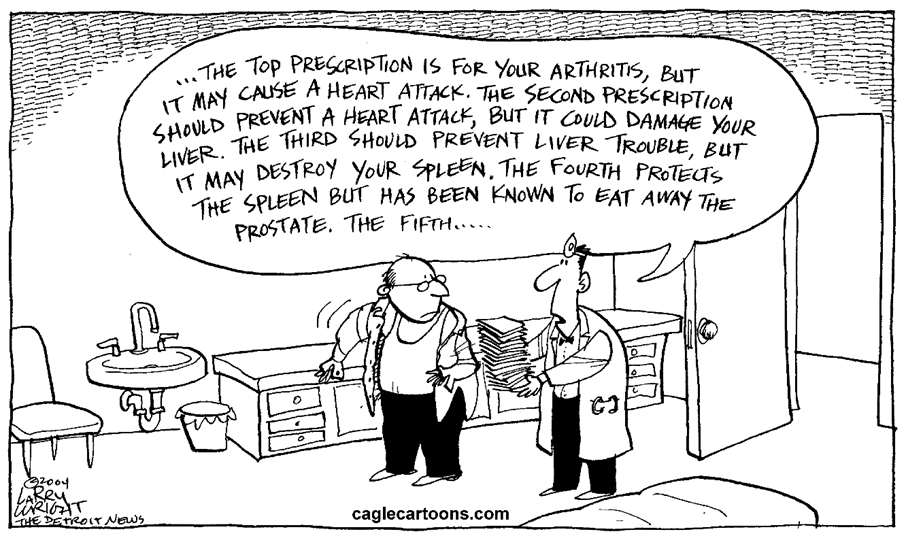It’s important to reduce medication prescriptions for older adults (and everyone else). Why do we want to reduce medication prescriptions? Because prescription drugs are the third leading cause of death in the United States and Europe. Only heart disease and cancer cause more death.
In 2014 Peter Gøtzsche, a medical doctor and internationally known researcher and book author, wrote an article, called “Our prescription drugs kill us in large numbers.” In some ways his work is more relevant today than when he first wrote it. As Dr. Gøtzsche points out:
- 50% of those who die have taken their drugs correctly. The other half die because of human error, such as too high a dose or use of a drug despite contraindications.
- Our government agencies are not particularly helpful. They offer a long list of warnings, precautions, and contraindications for each drug, even though they know that no doctor or pharmacist can possibly remember all of these.
- Major reasons for the many drug deaths include inadequate drug regulation, inaccurate “scientific” evidence about drug safety, and even bribery of doctors to encourage them to prescribe more. Direct-to-consumer drug marketing, unfortunately, is rife with lies. It is as harmful as tobacco marketing.[1]
We Must Reduce Medication Prescriptions for Older Adults: A Matter of Life or Death
In 2019 the average life expectancy in the United States was 78 years, 10 months. In 2020, it dropped to 77 years. Last year, it fell to about 76 years, 1 month. The last time it was that low was in 1996.[2]

Moreover, it’s likely the drugs are not working. For each person who benefits from the 10 best-selling drugs in the United States, between 4 and 25 patients see no beneficial effect.
If the prescription medication isn’t even working, that makes it even more urgent for doctors, nurses, and other healers to work hard to reduce medication prescriptions for older adults.

Indeed, overmedication is an increasing problem among older adults. One drug causes side effects that then must be managed with another drug. A third prescription is added to the mix to counteract the negative effects of the other two. Polypharmacy is a growing problem among seniors.
Overmedication benefits the drug companies, giving them customers for life. But it hurts older adults. It can cause adverse drug reactions. Multiple prescriptions are often a burden on a patient’s resources, not only because of co-pays but because of the time and expense it takes to get to the drugstore. And overmedication can lead to confusion as well as noncompliance.
Polypharmacy in older adults also leads to negative health outcomes, including falls, impaired cognition, reduced quality of life, and general decline.
This is a true story, reported in the Washington Post, about a woman who was in the hospital for a severe asthma attack. In the hospital she was prescribed steroids for the asthma, which made her blood pressure too high and caused vertigo. So, the hospital prescribed a blood pressure medication, which made her dizzy. Then her ankles began to swell, so she was given a water pill, which in turn caused her potassium levels to bottom out. So then the doctors added potassium supplements. To top it all off she was given a drug to treat osteoporosis, which eventually lead to gastric bleeding. Prescribed multiple medications, this poor patient, an 83-year-old grandmother, told the reporter, “I came out sicker than I went in.”
How to Take Less Medication: Five Tips
Now that we know that it is really important to reduce medication prescriptions for older adults, how do we go about it?
I have been working with people who want to take back their health for over 40 years now. Here are my best recommendations to accomplish reducing medication prescriptions for older adults.
Always get a second opinion (or even a third or a fourth)
Before starting any prescription drugs, no matter how “common” or seemingly “benign,” it is important to make sure you actually need them. Doing some research on the internet is helpful, but visiting an experienced healer for a second opinion is an even better strategy. If you don’t feel you have the time or the money for extra appointments, it’s likely you have a friend of a friend or even a family member willing to share their experience and ideas with you.Start at the lowest possible dosing:
For any prescription medication you take, it is important to get the dosing right. This varies from person to person. Be sure to tell your doctor that you want less, not more. If your problem doesn’t respond to a low dose, you can always increase it.Plan ahead to taper down:
Don’t let any doctor tell you that you must be on a medication for the rest of your life. When a doctor says that, they are parroting drug company propaganda. Instead inform your doctor that you would like the medication to be temporary. Then, together, you can come up with a plan to taper off the drug or drugs.Find out about alternatives:
There are excellent natural alternatives to many prescription medications that work just as effectively as synthetic drugs but do not have as many side effects. For example, white willow bark has been used as a natural analgesic since Egyptian times and some people find drinking white willow bark tea to be helpful for brain fog and pain. You can also make nutrition and lifestyle changes to improve your condition. A holistic healer, integrative M.D., or naturopathic doctor can help you learn about alternatives.Trust your intuition:
You know your body better than anyone else. If you feel that you need to reduce your prescription medications, chances are you are right. In the allopathic model, we get away from intuition. But an intuitive approach may be the best thing we can use to help reduce medication prescriptions for older adults.
About the Author: Donald R. Yance is the founder of the Mederi Center. He is also the author of the book Adaptogens In Medical Herbalism: Elite Herbs and Natural Compounds for Mastering Stress, Aging, and Chronic Disease. A Clinical Master Herbalist and Certified Nutritionist, Donnie is renowned for his extraordinary knowledge and deep understanding of the healing properties of plants and nutrition, as well as of epigenetics, laboratory medicine, oncologic pathology, and molecular oncology. He is a professional member of the American Herbalists Guild, National Association of Nutrition Professionals, Academy of Integrative Health and Medicine, and the Society for Integrative Oncology.
[1] Gøtzsche PC. Our prescription drugs kill us in large numbers. Pol Arch Med Wewn. 2014;124(11):628-34. doi: 10.20452/pamw.2503
[2] Ryan K. Masters, Laudan Y. Aron, Steven H. Woolf, CHANGES IN LIFE EXPECTANCY BETWEEN 2019 AND 2021: UNITED STATES AND 19 PEER COUNTRIES, medRxiv 2022.04.05.22273393; doi: https://doi.org/10.1101/2022.04.05.22273393









